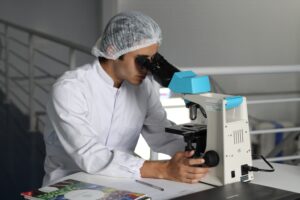
Meet Luc Woodall Gillard, an expedition medic and photojournalist in some of the world’s harshest and most remote environments. Luc is a political commentator with Young Voices UK, photo lead for Adventure Medic Magazine and a Fellow of the Royal Geographical Society in London. His work focuses on health, conservation, humanitarian crises and conflict.
Although there is still no definitive answer for what caused the COVID-19 pandemic, it seems clear that poor wildlife practices were a contributing factor in the disease spreading from animals to humans. We can hope the worst of that disaster is behind us, but unless we modernise our methods, more global pandemics are in our future.
COVID-19 was likely spread through a wet market, where animals both dead and alive are within close proximity of each other. This, however, is not the only source of zoonosis — diseases spread from animals to humans. In fact, this can be seen all over the planet, due to the world’s mass and irresponsible expansion of urbanisation and farming.
This expansion has led to the destruction and imbalance of essential ecosystems that have provided historical barriers to the spread of disease.
If we are to protect and restore what is left of the fragile ecosystems which govern our world, governments must invest in modernising current infrastructure, especially within agriculture.
The World Organisation for Animal Health (WOAH) says there has been “an unprecedented number of outbreaks” of bird flu around the world since it reemerged in Europe and Asia in October 2021. While bird flu predominantly stays among bird populations, it is now also affecting mammals. The World Health Organization (WHO) is monitoring closely to see if the H5N1 virus will mutate into a form that could cause zoonosis.
Zoonosis has increased globally, especially in Africa where it is linked to 30% of public health events. This increase in outbreaks is a result of the ecological imbalance created by the human expansion of natural habits.
This can be seen in Uganda, where there is currently an outbreak of Sudan Ebola Virus, in which the suspected reservoir host, a species of bat, has been forced from its natural habitat into human-populated environments because of deforestation. Ultimately, this eviction has led to infection and even death among humans.
The intrinsic link between human, veterinary and environmental health, collectively called One Health, has been a recognised scientific phenomenon for decades. As such, scientists have pushed for global health policy to be dealt with in a combined and holistic manner. This was first codified during the One World, One Health conference in 2004, leading to the Manhattan Principles. While this created strategic goals to enhance the health of all species and the planet, the world has so far lacked a consensus approach in handling One Health.
Instead, policy has isolated the three elements of One Health leading to none of the goals set out in 2004 being achieved 20 years later. Elements of the Manhattan Principles, such as the restoration of ecosystems and the establishment of a safe animal trade, have appeared in global policy, including the United Nations (UN) 2030 Sustainable Development Goals (SDGs) Agenda, and the UN Biodiversity Conference (COP15), which in 2022 created a landmark biodiversity agreement. However, neither of these features combined thinking between healthcare and the world’s ecosystems. Instead, they continue to isolate the problem within individual SDGs, continuing the cycle of disjointed global health policy.
This year marks the halfway point of the SDGs with the 28th meeting of the Committee of Paris (COP28) being held in Dubai in November. One Health must be introduced into the framework this year. While the agenda at COP28 must look globally, support must be driven to where it’s needed most. Currently, this is in the global south and east, where populations continue to grow. It is here that stakeholder engagement at regional and local levels must be prioritised, as this is where historic and current attempts for the enforcement of a safe, legal, and sustainable wildlife trade especially in China have failed.
The reasons for this are unclear, but it could be our approach, which has so far divided countries, rather than promoting a bilateral exchange between countries to achieve these mutually beneficial goals.
But this is not just a problem for the developing world. Britain, like many Western countries, must also look internally. This year, the British Government has released documents highlighting their use of One Health to combat global health threats within the U.K. and abroad. However, this framework focuses on reaction and doesn’t address the need for changes in the way we live. The U.K. needs to be one of the leaders at the forefront of the One Health push ahead of COP28.
The UN Environment Programme (UNEP) has identified nature-based solutions to reduce the risk of zoonotic spillover. Some of these are shared with the Manhattan Principles, including the protection and restoration of ecosystems and the creation of safe, legal, and sustainable global wildlife trade. In the U.K., we must put more emphasis on creating a more sustainable supply chain, especially within agriculture and urbanisation.
The longevity of British agriculture relies on advancements in technology and practices being introduced and legislated. The lessons Britain implements can be spread across the world. There is enough cultivated land to feed the entire planet’s population, yet we continue to expand. The reasons behind this are complex; not only are there significant disparities between countries in infrastructure, but also in technology.
The U.K. must take the lead in implementing One Health in the global agenda, especially at COP28. If these solutions are to be successful, it will require international cooperation and enforcement. While many outbreaks might be contained at local or regional levels, COVID-19 showed it only takes one disease to succeed where others have failed. If we embrace the necessary changes to the way we live, we can create a better and safer planet for all species.

Contributor to The London Financial
We combine research produced by students and early professionals into a single website, breaking down the barriers to entry individuals face in a number of industries.
Contributor opinions are their own and do not necessarily reflect the stance of the LF.